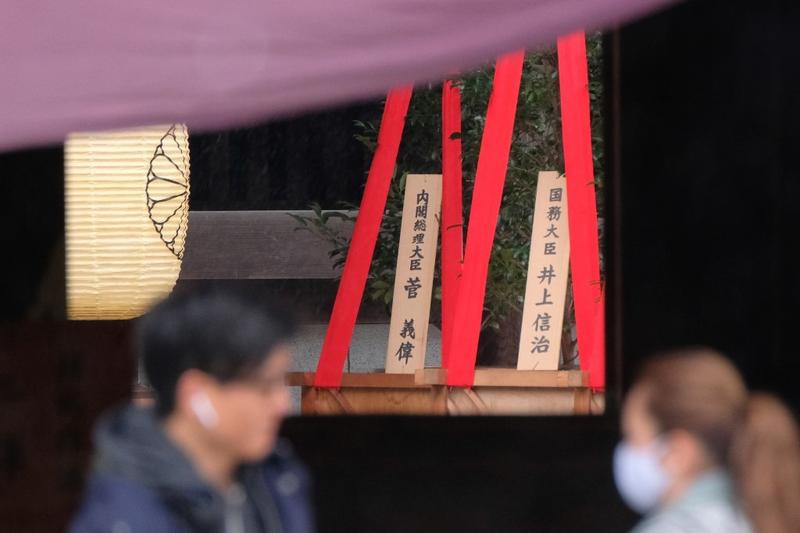 A wooden plaque (background) showing the name of Japanese Prime Minister Yoshihide Suga is seen with a "masakaki" tree that he sent as an offering to the controversial Yasukuni Shrine in Tokyo on Oct 17, 2020.
(KAZUHIRO NOGI / AFP)
A wooden plaque (background) showing the name of Japanese Prime Minister Yoshihide Suga is seen with a "masakaki" tree that he sent as an offering to the controversial Yasukuni Shrine in Tokyo on Oct 17, 2020.
(KAZUHIRO NOGI / AFP)
TOKYO - Japanese Prime Minister Yoshihide Suga on Saturday sent an offering to the controversial Yasukuni Shrine for war dead to coincide with its autumn festival.
READ MORE: Former Japan PM Abe visits Yasukuni Shrine for war dead
It would be Suga’s first such offering to the shrine since taking office last month. His predecessor, Shinzo Abe, had also regularly sent offerings via an aide on the anniversary of Japan’s surrender in World War II and during the shrine’s spring and autumn festivals.
It would be Yoshihide Suga's first such offering to the shrine since taking office last month
The shrine, in Tokyo, is seen by Beijing and Seoul as a symbol of Japan’s past military aggression because it honors 14 Japanese wartime leaders convicted as war criminals by an Allied tribunal as well as 2.5 million Japanese war dead.
Abe’s pilgrimage to the shrine in 2013 sparked outrage in South Korea and China and an expression of “disappointment” from the United States.
Suga made a visit to the shrine in August 2011, according to a post on his official blog, well before becoming the Abe government’s chief cabinet secretary in December 2012.
ALSO READ: Abe sends offering to controversial shrine for war dead
The South Korean government “expresses deep regret that Japan’s government and congressional leaders have again dedicated an offering to the Yasukuni Shrine which glorify Japan's past invasions,” the foreign ministry said in a statement on Saturday.
It said it urged Japanese leaders to face up to history and show “humble and genuine reflection” through action with the launch of a new cabinet.
Ties between Tokyo and Seoul have remained strained due to bitter memories of Japan’s 1910-1945 colonization of the Korean peninsula, including a dispute over compensation for Koreans forced to work on Japan’s sites during wartime. Tokyo says the matter was settled by a 1965 treaty normalizing bilateral relations.
Abe visited Yasukuni on Sept 19, days after he stepped down as Japan’s leader.


